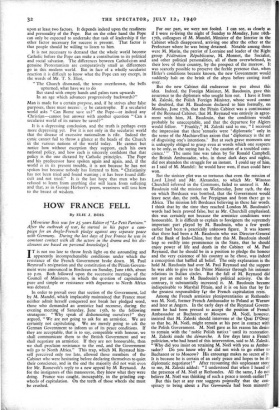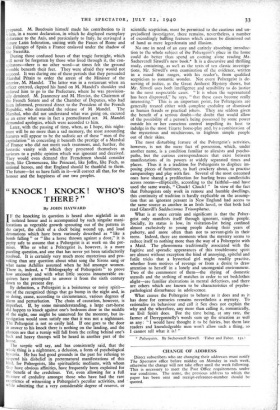HOW FRANCE FELL
By ELIE J. BOIS
[Monsieur Bois was for 25 years Editor of "Le Petit Parisien." After the outbreak of war, he started in his paper a cam- paign for an Anglo-French pledge against any separate peace with Germany. During the last days of free France he was in constant contact with all the actors in the drama and his dis- closures are based on personal knowledge.] TT is not too late to throw fresh light on the astounding and apparently incomprehensible conditions under which the resistance of the French Government broke down. M. Paul Reynaud's resignation and the constitution of the Petain Govern- ment were announced in Bordeaux on Sunday, June 16th, about to p.m. Both followed upon the successive meetings of the Council of Ministers, in which the qcestion of capitulation pure and simple or resistance with departure to North Africa was debated.
In order to prevail over that section of the Government, led by M. Mandel, which implacably maintained that France must neither admit herself conquered nor break her pledged word, those who demanded an armistice had recourse, during the evening meeting of Saturday, June Isth, to the following stratagem: " Why speak of dishonouring ourselves?" they argued, " We are not going to ask for an armistice. We are certainly not capitulating. We are merely going to ask the German Government to inform us of its peace conditions. If they are acceptable, that is to say, compatible with honour, we shall communicate them to the British Government and we shall negotiate an armistice. If they are not honourable, then we shall proclaim resistance to the end, and the Government will go to North Africa." This trap, which M. Reynaud him- self perceived only too late, allowed those members of the Cabinet who were hesitating before declaring themselves to quiet their conscience, and in the end the majority did not wait even for Mr. Roosevelt's reply to a new appeal by M. Reynaud. As for the instigators of this manoeuvre, they knew what they were doing. France was caught, inescapably, in the grinding cog- wheels of capitulation. On the teeth of those wheels she must be crushed. For our part, we were not fooled. I can see, as clearly as if I were re-living the night of Sunday to Monday, June 16th- x7th, colleagues of M. Mandel, Minister of the Interior in the Cabinet which disappeared, arriving one after the other at the Prefecture where he was being detained. Notable among them were M. Marin, the patriot of Lorraine and leader of the Right group Fideration Republicaine, M. Monnet, the Socialist, and other political personalities, all of them overwhelmed, in their love of their country, by the prospect of the morrow. It was scarcely possible to preserve the feeble pretence that, when Hitler's conditions became known, the new Government would suddenly halt on the brink of the abyss before casting itself over.
But the new Cabinet did endeavour to put about this idea. Indeed, the Foreign Minister, M. Baudouin, gave this assurance to the diplomats who sought him out. I have it from M. Zaleski, the Polish Foreign Minister, whose word cannot be doubted, that M. Baudouin declared to him formally, on Monday, June i 7th, that the Petain Cabinet was a continuance of the Reynaud Cabinet, that M. Reynaud was entirely in agree- ment with him, M. Baudouin, that the conditions would probably be unacceptable, and that the departure for Algiers would follow. " Frankly,". M. Zaleski said to me, " I received the impression that these remarks were ' diplomatic ' only in the sense of the Machiavellian axiom that ` diplomacy is the art of disguising one's intentions.' But at such grave moments one is unhappily obliged to grasp even at words which one suspects to be only, as the saying has is, ' the caution of a troubled cons- cience.' " The same line was taken by Sir Ronald Campbell, the British Ambassador, who, in those dark days and nights, did not abandon the struggle for an instant. I could say of him, as I said of M. Mandel: he would have won, if man could have won.
But the sinister plot was so tortuous that even the mission of Lord Lloyd and Mr. Alexander, to which Mr. Winston Churchill referred in the Commons, failed to unravel it. Mr. Baudouin told the mission on Wednesday, June xgth, the day on which Bordeaux was bombed, that the Government would leave next day, the loth, for Perpignan and from there go to Africa. The mission left Bordeaux believing in these fair words. I think that by the time they reached London M. Baudouin's words had been proved false, but as Mr. Churchill emphasised, this was certainly not because the armistice conditions were honourable. It is difficult to explain to foreigners the supremely important part played by M. Baudouin, who a few weeks earlier had been a practically unknown figure. It was known that there had been a M. Baudouin who was Director-General of the Bank of Indo-China, but that this M. Baudouin should leap so swiftly into prominence in the State, that he should enjoy power of life and death in the Cabinet of M. Paul Reynaud, that he should be in a position to pledge the honour and the very existence of his country as he chose, was indeed a conception that baffled all belief. The only explanation is the hold M. Baudouin had over M. Paul Reynaud and the support he was able to give to the Prime Minister through his intimate relations in Italian circles. But the fall of M. Reynaud did not put an end to M. Baudouin's political activity. On the contrary, it substantially increased it. M. Baudouin became indispensable to Marshal P4tain, and it is on him that by far the greatest responsibility fir the French capitulation rests.
Among the French armistice plenipotentiaries at Rethondes was M. Noel, former French Ambassador to Poland at Warsaw and later at .Angers. In the early days of the Reynaud Govern- ment he had been pressed to accept the position of French Ambassador at Bucharest or Moscow. M. Noel, however, insisted that M. Zaleski should intervene at the Quai D'Orsay so that he, M. Noel, might remain at his post in contact with the Polish Government. M. Noel gave as his reason his desire to remain with the ` noble Polish nation' until its restoration. M. Zaleski made the demarche. A few days later a French politician, who had heard of this intervention, said to M. Zaleski, " Why did you insist on retaining M. Noel with you as Ambas- sador? Do you know why he did not wish to go either to Bucharest or to Moscow? His entourage makes no secret of it. It is because he is certain of an early peace and hopes to be its diplomatic negotiator!" After recounting this unpleasant story to me, M. Zaleski added: " I understood that when I heard of the presence of M. Noel at Rethondes. All the same, I do not believe M. Noel was thinking of such a peace a month earlier!"
But this fact at any rate suggests pointedly that the con- spiracy to bring about a Pax Germamca had been minutely prepared. M. Baudouin himself made his contribution to it hen, in a recent declaration, in which he displayed exemplary deference to the Axis, and particularly to Italy, he envisaged a future Latin federation, uniting with the Fasces of Rome and the Falanges of Spain a France enslaved under the shadow of the Swastika.
During those confused hours of that tragic fortnight, which will never be forgotten by those who lived through it, the con- spirators—there is no other word—at times felt the ground tremble beneath their feet. They were afraid they would not succeed. It was during one of these periods that they persuaded Marshal Petain to order the arrest of the Minister of the interior, M. Mandel. The latter was in a restaurant when an officer entered, clapped his hand on M. Mandel's shoulder and ordered him to go to the Prefecture, where he was provision- ally detained. M. jeanneney and M. Herriot, the Chairmen of the French Senate and of the Chamber of Deputies, who had been informed, protested direct to the President of the French Republic, who demanded the release of M. Mandel. The Marshal, who did not understand what was going on, excused as an error what was in fact a premeditated act. M. Mandel demanded apologies, which were accorded ta him.
Later, with the passing of time, when, as I hope, this night- mare will be no more than a sad memory, the most astounding features will appear to be the sadistic act of these " men of the capitulation " in concealing it beneath the prestige of a Marshal of France who did not merit such treatment, and, further, the fantastic vanity with which they presented themselves as saviours to a public opinion which was ignorant and deceived. They would even demand that Frenchmen should consider them, like Clemenceau, like Poincare, like Joffre, like Fach, as national heroes, and that ' at England should be thankful to them. The future—let us have faith in it—will correct all that, for the honour and the happiness of our two peoples.



























 Previous page
Previous page